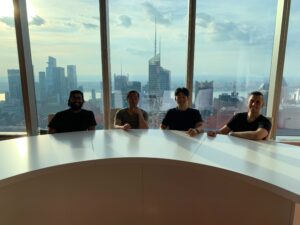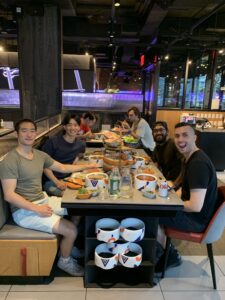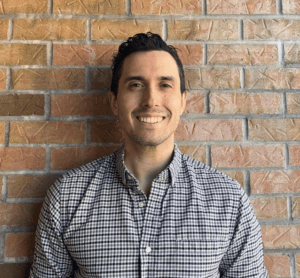Aktos is building an operating system to power the Accounts Receivable Management (ARM) industry, a space still rife with inefficient workflows, compliance challenges, and outdated payment systems. Aktos is aiming to change that, becoming the first and only modern collection software for debt collection agencies tired of settling for the same old 20+ year-old solutions.
We recently sat down with Alvaro Atienza, Staff Site Reliability Engineer (SRE) at Aktos, to learn more about what it’s like working at a hypergrowth, early-stage startup. In our conversation, we discuss his career journey, upbringing in the software world, and what life is like as an engineer at Aktos.
Interview
What sparked your interest in software engineering and led you to pursue it as a career? Can you share a bit about your journey?
My initial encounter with computer science was in college, where after my very first class, it became the most challenging subject I had ever encountered. I found this incredibly appealing, and I knew that focusing on it would allow me to constantly learn and improve.
My journey in engineering began at a startup where the founders were hungry, and motivated, which convinced me that this was the right career path for me. Startups offer the versatility to explore various aspects of technology and are often the base grounds for learning and experimentation, allowing me to dabble in diverse aspects of technology. My role evolved over time, shifting from front-end to back-end engineering, and eventually leading me into DevOps.
The latter half of my career has been in site reliability engineering, where I’ve focused on scaling legacy systems and working at larger organizations. I now have the opportunity to play different influential roles at Aktos.
Can you give us an overview of Aktos?
Aktos fundamentally exists to solve people’s problems. We work in the collections space, where 70% of Americans have some form of debt. The collections industry has these 20-40 year-old incumbents, and because they’ve struggled to evolve with the changing laws, there’s a lack of transparency, and a loss of accuracy to consumers, which ultimately interrupts people’s lives causing problems. Aktos can step in, and provide clear ways for folks to interface with and resolve their debts while applying the various compliance standards and laws across the country because each state may handle different debts and consumers differently.
Walk us through some of the steps you took towards your current position.
After exploring various startup roles early in my career, and then transitioning to increasingly larger organizations following my initial experience, I developed a strong desire to wear many hats, deepen my knowledge, and expand my horizon. The idea of joining another startup seemed like the perfect opportunity to achieve this, and Aktos stood out. They offered me the chance to apply my accumulated skills and make an immediate and tangible impact for our customers, such as improving our performance and taking processes that would otherwise take over a minute, down to a handful of seconds. The prospect of tackling new challenges and contributing to a fast-paced team was thrilling.
Joining Aktos in 2023 was a turning point for me. While there was a certain degree of risk in leaving a stable position, the opportunity to make a constant, visible impact was compelling. In larger organizations, I often followed a structured path, confined to a certain project for months, whereas, at Aktos, I could work on SOC2 compliance, product design, client support, database performance, and, in general, software engineering on any given day. I got to wear so many different hats that were radically different from everything I’d done, spreading far beyond my comfort zone. It’s very hard to grow, learn, and do new things if I’m just comfortable with what I’m doing.
What drew you to Aktos? Was there a specific aspect of the company that excited you the most?
Several factors convinced me that Aktos was the right fit. Interactions with leadership and their focus on creating an environment for learning and improvement were crucial. We have regular engineering huddle meetings and one-on-ones with the CTO providing constructive feedback and a lot of collaboration as a whole. We discuss what’s working and what we can do better to improve.
In my one-on-ones with the CTO, he always ends each meeting with one very specific question: What could we be doing better? These are great signs that this is what I want. An example of this is when I was having trouble communicating the key messages in my presentations. Previously, I’d spent too much time on details, that at the end of my presentations, there was often uncertainty around what I was trying to get across. The CTO provided me with actionable feedback, with examples of how I could improve, and regularly checked on my progress. He introduced me to the Minto Pyramid Principle, a method designed to structure thoughts coherently for writing, conveying ideas, and enhancing presentations, which helped me tremendously. As an engineer, it’s easy to become engrossed in technicalities, overlooking the broader competencies that contribute to a well-rounded career path. Being in an environment that supports that is where I want to be.

What were your initial expectations when joining Aktos, and how did they align with the reality of your experience after a few months?
I’ve been in startups before. I knew startups are hard. No one joins a startup thinking it’s going to be easy. What I didn’t expect were all of the opportunities to do so many different things within Aktos. I came in expecting to be very focused on the technical aspects of things, but there’s this huge dedication here to both the product and our clients. That was transformative; I’ve gotten to do so much here, including customer-facing work.
What do you consider to be the most significant challenge in your day-to-day role, and how do you approach it?
One thing I discovered is that certain tasks require uninterrupted focus. I can’t put my best foot forward working on database performance, while simultaneously juggling client support. I have to look at what is the most important thing each day, think through what I can balance, and exercise ruthless prioritization.
In what ways are you encouraged to experiment with new technologies as part of your job?
When it comes to experimenting or introducing something new with Aktos, there are accompanying principles of responsibility and maintenance that come along with it. I’m a site reliability engineer, and I often want to introduce new technologies, such as Kubernetes. But I have to be careful about when to bring it in because this may be new to the rest of the folks, who will also likely end up touching it. If I’m going to bring it in, it has to solve a genuine problem and not be something that I’m just interested in; it’s on me to show my colleagues how to get comfortable with it, fix issues if they arise, and know where to go if they need additional help. Experimentation comes with the responsibility that I’m not just building software for myself. I’m building it with the team in mind.
So, we try to focus on very battle-tested tech. We’re not really on the bleeding edge. We use Python, Django, Celery, AWS, Terraform, and containers. These are all very well-known things, but very flexible. If we’re, for example, trying to introduce something new, and it has only 15 search results on Stack Overflow, it’s likely harder to fix, and not widely used; if it has 15,000 search results, it’s much easier to maintain.
Also, we want to hire people with superpowers in certain tech. If it’s too new, it’s hard to find someone amazing with expertise, so we choose well-known, reliable technologies to implement. We evaluate software to fit our needs, and then start using them. Does that mean we’ve never had to go back on a choice? No. For example, we were using Lambda for a while, and certain timeout restrictions limited us. Given the foundation that we have, it’s great that we’re able to build on it and move forward rather than have to start from scratch. That’s been instrumental in giving us the flexibility we need.
How would you describe the company’s culture in a few words, and why did you choose those words?
For the company’s culture, I’d frame it in two very specific words: support and preparedness.
When I talk about support, I am not talking about technical support, but rather about this idea of engineers having superpowers. We can cover each other’s gaps with our skill sets. Aktos is a place where I feel safe talking about something that I’m bad at, like the communication example I gave before. That’s not easy to do in front of co-workers. You’re vulnerable. But this is a place where I know people have my back. Everyone on the team wanted me to win, and being able to be honest and open about that in this environment is what gave me the courage to admit my weakness, and ultimately improve on it.
Then there’s the idea of preparedness, the application of learning. When we run into something that hasn’t worked, we make sure that when we solve the immediate problem, it won’t affect us again. Recently we onboarded a new client. They tripled the amount of the data that we had in production, which made us experience a slowdown right before they went live. It took one page over a minute to load. I stepped in and brought the database performance back to what we expected. But that’s today’s problem. To fix tomorrow’s, I’m modifying our dev environment to always be significantly larger than production for us to load test against.
What makes the engineering team at Aktos stand out?
Aktos has a couple of things that I think make it a very unique environment. We have a very strong, product-first mindset. In previous jobs I was far away from the client and the product, diving into infrastructure and large scale systems. Now I’m drawing user journeys, feature wireframes, etc.
Aktos’s engineering team stands out by being a celebration of superpowers. I get to work with engineers who are Django experts and can look at one line of code and say, “I know what this is going to do, and you don’t want it to do this in the database.” My superpower would be making sense of the unknown, like why the application suddenly ran out of memory with no changes.

Have you ever pitched an idea that seemed crazy on the surface but was warmly embraced at Aktos?
Absolutely. Our clients need customizable and easily managed reports of their data including a variety of visualizations and tables. We had a third-party API provider that could do the reports for us fairly well, but there were so many more components to the feature than just creating the baseline reports. I figured out a way to give our clients this fully self-service solution where they can manage who sees what reports securely, and modify them however they want. It’s all within their control, and we don’t have to interface too much to be able to support them. It was a non-standard way of using the API. I was able to communicate my ideas and everyone was excited to be able to move us in that direction.
Tell us more about the work environment at Aktos.
Aktos is fully remote, but it doesn’t hinder collaboration or communication at all. I would say we’re very, very productive. I’ve worked in-office and hybrid environments at previous companies, and sometimes it can be very distracting. In person, it was challenging to get the kind of focus and intense work that I like to do.
Aktos is spread across the U.S. — we have people on the West Coast, East Coast, we have people in Canada, and there are a variety of time zones that we have to navigate. Making sure that there’s an overlap of working hours is one of the tricky parts of being fully remote, so I tend to have my hours shifted a bit more than the other engineers in the same time zone. Regardless, I prefer it so much more than being in-office. We’re all professionals, and we have the autonomy to create our own schedules that best fit us.
There’s a lot of visibility across the teams in general; we’ve been doing team-building events, such as a regular game night with Jackbox games. We have events like that where you get to see who you’re working with. It helps to be able to put a face to the name of the avatar in the Slack channel. We also make jokes about it, and when we’re on calls, it’s more personable. Sometimes it feels less like a business meeting and more of a casual chat with your colleagues. I think that makes a huge difference.
Being fully remote, it’s just something that has to be part of the workflow. It’s something that you have to actively consider upfront and put conscious effort towards, and Aktos has done a great job of that.
What qualities, do you believe, make someone well-suited for a startup environment?
In a startup environment, the product mindset is highly important. A candidate that breaks down a problem from a very high, non-technical level, and then subsequently distills it down to its components, is a great fit for Aktos. If a startup feels right for you, research the organization. Figure out what it is that they’re looking for and if that’s a great match. Don’t hesitate in taking the risk to apply even if you feel you lack certain requirements. Never, ever turn yourself down. Give it a shot. Once you’re in, give it your best.
A fundamental drive and hunger to push through any problem and to take on more challenges, and self-reflection are key to ambition. That’s so necessary for a startup because startups aren’t places that are comfortable; it’s about building that drive to keep on growing and pushing. It’ll take a lot of heart and a lot of thinking.
What career advice would you give to aspiring software engineers at startups?
Two things come to mind, and they’re heavily influenced by my passion for learning. The first is the importance of being honest about your limitations. It’s challenging and intimidating, but acknowledging your weaknesses allows you to improve in areas you might not have recognized as deficient, as well as in those you already knew needed enhancement. The second is that if you aim to improve at something, you should find a way to measure your progress. This doesn’t require a scientific method; simply find a tracking system that suits you.
Looking ahead, how do you envision Aktos evolving or growing in the near future?
Aktos is scaling rapidly, onboarding more clients, and facing typical challenges in scaling software. We have incumbents in this industry who’ve been around for 20 to 40 years, and some of the code bases for the products we’re replacing are written in COBOL and other legacy programming languages. We have tremendous confidence in our opportunity to match and outperform the feature sets of platforms that have been around for an eternity. There’s so much opportunity for growing technically, growing the product, growing the company, and growing in every possible way. It’s going to be a roller coaster, and I’m so excited about that!
To learn more about Aktos, check out our investment thesis, their website, and open jobs.





